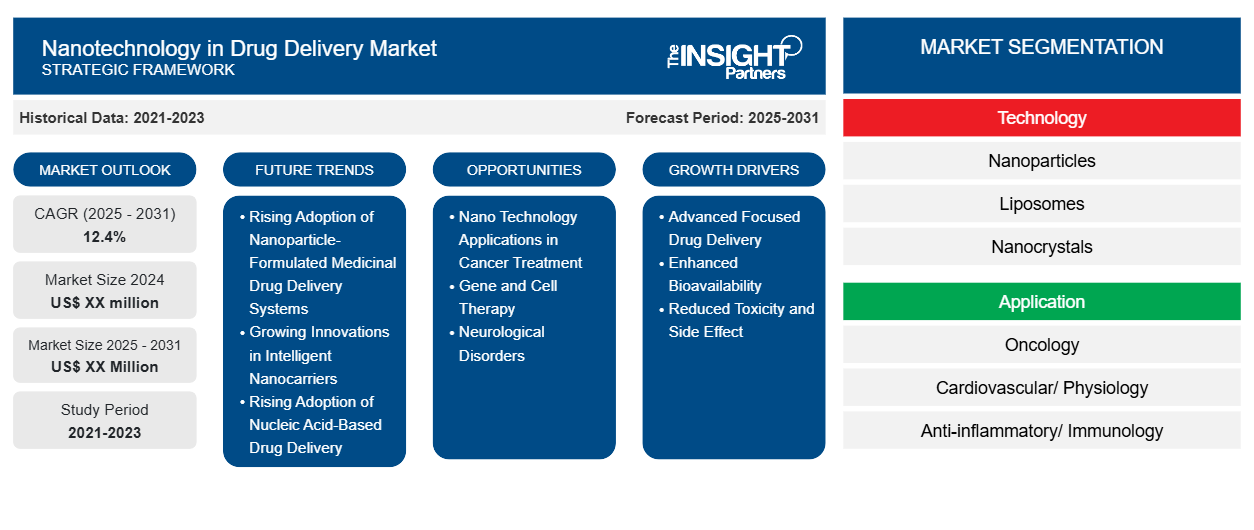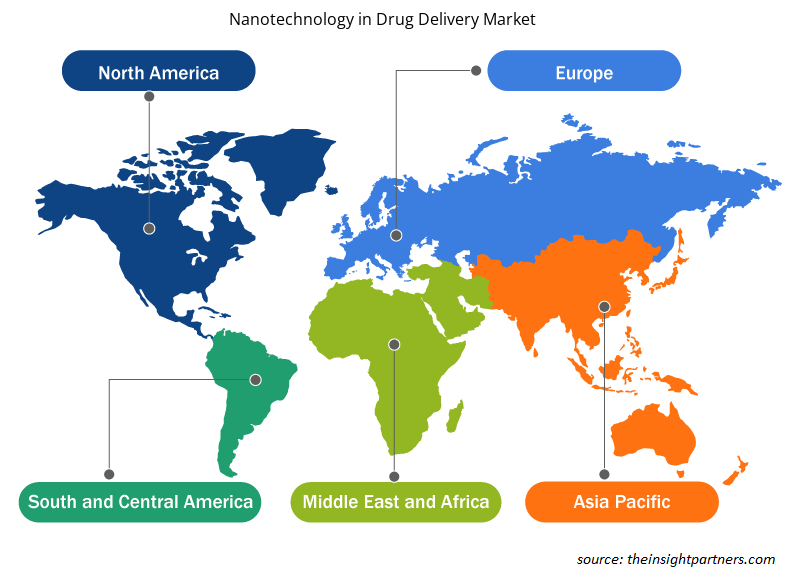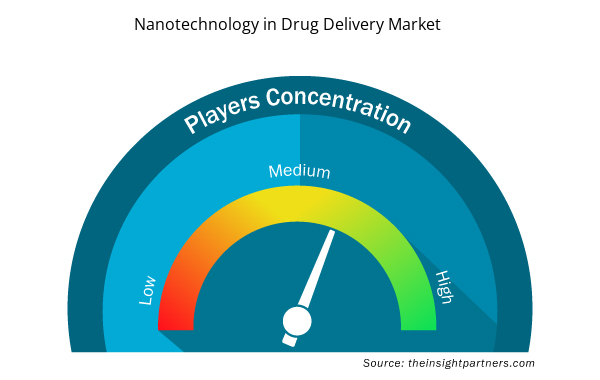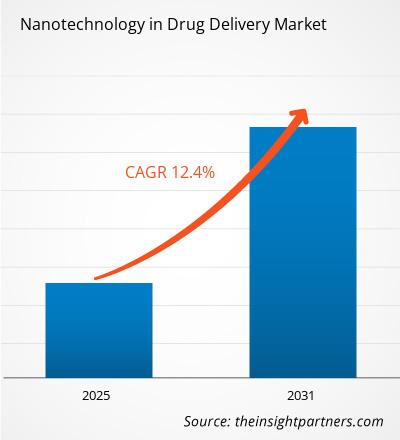The Nanotechnology in Drug Delivery Market is expected to register a CAGR of 12.4% from 2025 to 2031, with a market size expanding from US$ XX million in 2024 to US$ XX Million by 2031.
The report is segmented by Technology (Nanoparticles, Liposomes, Nanocrystals, Micelles, Others). The report is segmented by Application (Oncology, Cardiovascular/ Physiology, Anti-inflammatory/ Immunology, Neurology, Anti-infective, Others) . The global analysis is further broken-down at regional level and major countries. The Report Offers the Value in USD for the above analysis and segments.
Purpose of the Report
The report Nanotechnology in Drug Delivery Market by The Insight Partners aims to describe the present landscape and future growth, top driving factors, challenges, and opportunities. This will provide insights to various business stakeholders, such as:
- Technology Providers/Manufacturers: To understand the evolving market dynamics and know the potential growth opportunities, enabling them to make informed strategic decisions.
- Investors: To conduct a comprehensive trend analysis regarding the market growth rate, market financial projections, and opportunities that exist across the value chain.
- Regulatory bodies: To regulate policies and police activities in the market with the aim of minimizing abuse, preserving investor trust and confidence, and upholding the integrity and stability of the market.
Nanotechnology in Drug Delivery Market Segmentation
Technology
- Nanoparticles
- Liposomes
- Nanocrystals
- Micelles
- Others
Application
- Oncology
- Cardiovascular/ Physiology
- Anti-inflammatory/ Immunology
- Neurology
- Anti-infective
- Others
Customize This Report To Suit Your Requirement
You will get customization on any report - free of charge - including parts of this report, or country-level analysis, Excel Data pack, as well as avail great offers and discounts for start-ups & universities
Nanotechnology in Drug Delivery Market: Strategic Insights

- Get Top Key Market Trends of this report.This FREE sample will include data analysis, ranging from market trends to estimates and forecasts.
Nanotechnology in Drug Delivery Market Growth Drivers
- Advanced Focused Drug Delivery: One primary aspect of nano-drug delivery is that it generally increases the precision of drug targeting. Drugs can be engineered as nanoparticles, which improve their efficacy and minimize side effects by carrying the drugs directly to the targeted tissue or organ. This is very relevant in the treatment of cancer, for example, where chemotherapeutic agents need to be directed at tumor cells without affecting healthy tissue. However, nanoparticles are also useful for unique precision applications in tackling other common challenges, such as drug resistance, with the hope of resultant improvement in patient outcomes.
- Enhanced Bioavailability: Therapeutic agents typically have a very poor bioavailability such that a very small portion of the administered dose would reach circulation and, thus, the target site. Nanotech tackles the issue whereby it manages to increase the solubility and stability of the drug for better absorption. Nanoparticles can shield poorly soluble drugs from degradation as a carrier for cp delivery using different routes: oral, intravenous, or transdermal. Most of them would thus enhance the efficiency of drug treatment while reducing high doses.
- Reduced Toxicity and Side Effect: Conventional drug delivery methods cause side effects because most of them are nonspecific in action. The nanoparticles provide means of much more controlled release mechanism, which reduces the chances of systemic effects. Also through proper engineering, the nanomaterials are developed in such a way that they are capable of timing and amount specific gradual release of drugs over time. As a consequence, it builds up a much more consistent therapeutic effect with few negative side effects imposed on patients, thus increasing compliance and improving efficacy in treatment.
Nanotechnology in Drug Delivery Market Future Trends
- Rising Adoption of Nanoparticle-Formulated Medicinal Drug Delivery Systems: One important trend in the field of nanotechnology drug delivery is the establishment of nanoparticle-based delivery systems, such as liposomes, dendrimers, micelles, solid lipid nanoparticles, and so on. Gradually, more nanoparticle carriers are used for the transport of a variety of drug formulations such as small molecules, biologicals, and nucleic acids. The protection of sensitive drugs, their target-selective delivery to the site of action, and release over time make nanoparticles a suitable candidate for a plethora of therapeutic applications.
- Growing Innovations in Intelligent Nanocarriers: The notion of 'smart' delivery systems for the market is an effective drug delivery approach. Smart nanoparticles are defined in their action triggered by specific pH values, temperature, light emissions, and even enzymatic activation signals, as they release their drug payloads only in the environment intended. For instance, a pH-sensitive nanocarrier administers drugs only within a tumor site that is acidic, while an enzyme-triggered system does the same process once particular enzymes that exist in diseased tissues are present. Innovations over classical controlled delivery technology have to do with the emerging technology.
- Rising Adoption of Nucleic Acid-Based Drug Delivery: Evidence also exists that major developments by nanotechnology in the future are into nucleic acid-based therapeutic modalities like RNA and DNA, shaping the development of even better applications in the treatment of genetic disorders, cancers, and viral infections. However, the coding elements are very unstable and have a very poor uptake by cells, thus setting the delivery mechanism very difficult. Lipid nanoparticles (LNPs) are increasing in popularity and application for delivering mRNA vaccines and gene therapy, which include nucleic acid-based therapeutic modalities. The COVID-19 pandemic accelerated the research studies on mRNA vaccines due to their success.
Nanotechnology in Drug Delivery Market Opportunities
- Nano Technology Applications in Cancer Treatment: Cancer poses one of the toughest health problems worldwide. This is where nanotechnology can be very beneficial for cancer treatment. Nanoparticles can be custom-engineered to localized sites of tumors and supply the chemotherapeutics, immunotherapeutics, or gene therapies directly to them, thereby increasing the specificity of the resultant therapeutic agents and minimizing damage to healthy cells. It also controls the delivery and direct release of drugs and hence is considered a revolution in cancer therapy that gradually renders these treatments more effective and less harmful.
- Gene and Cell Therapy: Nanotechnology is increasingly showing promises for gene and cell therapies, which have already provided new hope for the treatment of several genetic disorders, inherited diseases, and some types of cancer. The incorporation of nanoparticles in the delivery of therapeutic gene-editing tools such as CRISPR/Cas9, siRNA, and mRNA could improve gene therapy by enhancing delivery efficiency and specificity. The field is very much buoyed by the dramatic success of treatments based on CRISPR and the burgeoning market for gene therapies.
- Neurological Disorders: The obstinacy of drug delivery to the brain is a major problem due to the existing blood-brain barrier, which is really considered a barrier to various therapeutic agents. Such an opportunity for nanotechnology is to develop advanced drug delivery systems that cross the BBB. Nanoparticles can be engineered to bypass or transiently open the BBB to allow direct drug delivery into the brain. Conditions like Alzheimer's, Parkinson's, or MS could benefit from this in that it may allow for groundbreaking treatment methods in the management of these more challenging neurological conditions.
Nanotechnology in Drug Delivery Market Regional Insights
The regional trends and factors influencing the Nanotechnology in Drug Delivery Market throughout the forecast period have been thoroughly explained by the analysts at Insight Partners. This section also discusses Nanotechnology in Drug Delivery Market segments and geography across North America, Europe, Asia Pacific, Middle East and Africa, and South and Central America.

- Get the Regional Specific Data for Nanotechnology in Drug Delivery Market
Nanotechnology in Drug Delivery Market Report Scope
| Report Attribute | Details |
|---|---|
| Market size in 2024 | US$ XX million |
| Market Size by 2031 | US$ XX Million |
| Global CAGR (2025 - 2031) | 12.4% |
| Historical Data | 2021-2023 |
| Forecast period | 2025-2031 |
| Segments Covered |
By Technology
|
| Regions and Countries Covered | North America
|
| Market leaders and key company profiles |
Nanotechnology in Drug Delivery Market Players Density: Understanding Its Impact on Business Dynamics
The Nanotechnology in Drug Delivery Market market is growing rapidly, driven by increasing end-user demand due to factors such as evolving consumer preferences, technological advancements, and greater awareness of the product's benefits. As demand rises, businesses are expanding their offerings, innovating to meet consumer needs, and capitalizing on emerging trends, which further fuels market growth.
Market players density refers to the distribution of firms or companies operating within a particular market or industry. It indicates how many competitors (market players) are present in a given market space relative to its size or total market value.
Major Companies operating in the Nanotechnology in Drug Delivery Market are:
- AbbVie Inc
- BlueWillow Biologics
- Pfizer
- Camarus AB
- Taiwan Liposome Co.
Disclaimer: The companies listed above are not ranked in any particular order.

- Get the Nanotechnology in Drug Delivery Market top key players overview
Key Selling Points
- Comprehensive Coverage: The report comprehensively covers the analysis of products, services, types, and end users of the Nanotechnology in Drug Delivery Market, providing a holistic landscape.
- Expert Analysis: The report is compiled based on the in-depth understanding of industry experts and analysts.
- Up-to-date Information: The report assures business relevance due to its coverage of recent information and data trends.
- Customization Options: This report can be customized to cater to specific client requirements and suit the business strategies aptly.
The research report on the Nanotechnology in Drug Delivery Market can, therefore, help spearhead the trail of decoding and understanding the industry scenario and growth prospects. Although there can be a few valid concerns, the overall benefits of this report tend to outweigh the disadvantages.
- Historical Analysis (2 Years), Base Year, Forecast (7 Years) with CAGR
- PEST and SWOT Analysis
- Market Size Value / Volume - Global, Regional, Country
- Industry and Competitive Landscape
- Excel Dataset



Report Coverage
Revenue forecast, Company Analysis, Industry landscape, Growth factors, and Trends

Segment Covered
This text is related
to segments covered.

Regional Scope
North America, Europe, Asia Pacific, Middle East & Africa, South & Central America

Country Scope
This text is related
to country scope.
Frequently Asked Questions
The Nanotechnology in Drug Delivery Market is estimated to witness a CAGR of 12.4% from 2023 to 2031
The major factors driving the Nanotechnology in Drug Delivery market are:
1. Advanced Focused Drug Delivery
2. Enhanced Bioavailability
Nano Technology Applications in Cancer Treatment act as a opportunity for growth of the market in forecast period.
North America region dominated the Nanotechnology in Drug Delivery market in 2023.
Players operating in the market are AbbVie Inc, BlueWillow Biologics, Pfizer, Camarus AB, Taiwan Liposome Co., Tarveda Therapeutics, Novartis, Nanobiotix, NanoCarrier Co., Ltd., CytImmune Sciences Inc
Nanoparticles segment, by technology, dominated the market in 2023.
Trends and growth analysis reports related to Life Sciences : READ MORE..
1. AbbVie Inc
2. BlueWillow Biologics
3. Pfizer
4. Camarus AB
5. Taiwan Liposome Co.
6. Tarveda Therapeutics
7. Novartis
8. Nanobiotix
9. NanoCarrier Co., Ltd.
10. CytImmune Sciences Inc

 Get Free Sample For
Get Free Sample For